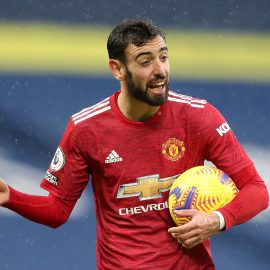The Guardian has always fancied itself as a bit different from your usual rags when it comes to football. But in a sneaky way. It doesn’t so much avoid the idle speculation and in-your-face headlines associated with the Red Tops, as dress them up with fancy words and add their own two-cents worth as well. It’s a policy that has served them well, earning the paper a decent reputation for insightful, and witty, analysis, and its podcast a place high up the iTunes charts.
Its Fantasy Football game is no different. They don’t need a huge advertising campaign to promote it, they don’t need an en-vogue football personality to help sell it to the public, and they don’t even need to offer a Manchester City-style incentive for people to play it. They simply let the game do the talking, and in all fairness, this particular game seems to have plenty to say.
Ah the complexities of modern football management! Once upon a time, a manager could simply pick his best eleven players, squeeze them into a nice balanced 4-4-2 formation, shout “get stuck in” a few times, and send his team out onto the pitch satisfied, having done all that he could do.
But how the times have changed. The modern day managers have a multitude of variables to consider when assembling a team, in fact, it isn’t a team game any more, it’s a squad game. And a lot of these issues, would you believe, crop up in Guardian Fantasy Football (henceforth to be referred to as GFF). Budget, formation, personal bias, substitutes, injuries, suspensions….they all have a bearing on a successful side, be it a real one or a fantasy one. True to form, the Guardian has painstakingly attempted to make GFF as close to the real thing as possible.
Budget/Prices
Money mad, that’s what modern day managers are. Money mad. First thing the papers are full of when a new boss walks into a new office is “how much will he have to spend?” Well the world of GFF is not much different (though there are no Arab billionaires to bail out underperforming teams here unfortunately), and megalomaniacs will be pleased to learn that each manager is allocated a budget of £100m at the start of the season.
The prices are pretty reasonable too, Cristiano Ronaldo (predictably) is the current most expensive purchase- approaching £13m- but the prices in the game fluctuate from week to week, which makes bandwagon jumping that little bit more difficult. Unlike on Fantasy Premier League however, managers receive the full benefit of a player’s increase in value should they opt to sell them on. It’s a nice concept, one that makes it feel a little bit more authentic, as you can balance the books nicely by selling an in-form player, and pick up a bargain with your remaining budget.
Squad/Formation
So once you have put that £100m into the bank, where are you going to spend it? Well, the Guardian does things a little differently to other games with the introduction of defensive midfielders. Therefore, each squad must comprise the following, and contain no more than three players from any one Premier League club:
- 2x Goalkeepers
- 5x Defenders
- 2x Defensive Midfielders
- 3x Midfielders
- 3x Strikers
Once you have your fifteen-man squad, you can switch your side between any of the following formations:
- 3-1-3-3
- 3-2-2-3
- 3-2-3-2
- 4-1-2-3
- 4-1-3-2
- 4-2-2-2
- 4-2-3-1
- 5-1-2-2
- 5-1-3-1
- 5-2-2-1
Looks complicated I know, but it is a lot easier than that. Do note the complete lack of 4-4-2, 4-5-1 & 3-5-2 however. This is not a game that rewards simplicity!
And you thought Countdown was complicated?!! Those crazy chaps at GFF have really come up trumps with this points system, gone are the days when a goal and a clean sheet were the only things fantasy managers had to look out for. The Guardian’s revolutionary system is thus:
| Scoring event |
Points awarded |
|||||
|
GK |
DF |
DM |
MF |
ST |
||
| First half appearance |
+1 |
+1 |
+1 |
+1 |
+1 |
|
| Second half appearance |
+1 |
+1 |
+1 |
+1 |
+1 |
|
| Goals |
+8 |
+8 |
+8 |
+8 |
+8 |
|
| Assists |
+4 |
+4 |
+4 |
+4 |
+4 |
|
| Shots on target |
+1 |
+1 |
+1 |
+1 |
+1 |
|
| Accurate cross |
+1 |
+1 |
+1 |
+1 |
+1 |
|
| Penalty miss |
-5 |
-5 |
-5 |
-5 |
-5 |
|
| Saves |
+2 |
– |
– |
– |
– |
|
| Penalty saves |
+5 |
– |
– |
– |
– |
|
| Goals conceded |
-1 |
-1 |
– |
– |
– |
|
| First half clean sheet |
+2 |
+2 |
+2 |
– |
– |
|
| Second half clean sheet |
+2 |
+2 |
+2 |
– |
– |
|
| Tackles won |
– |
+1 |
+1 |
+1 |
+1 |
|
| Last man tackle |
– |
+2 |
+2 |
+2 |
+2 |
|
| Blocked shots |
– |
+1 |
+1 |
+1 |
+1 |
|
| Interceptions |
– |
+1 |
+1 |
+1 |
+1 |
|
| Clearance |
– |
+1 |
+1 |
+1 |
+1 |
|
| Yellow cards |
-2 |
-2 |
-2 |
-2 |
-2 |
|
| Red cards |
-8 |
-8 |
-8 |
-8 |
-8 |
|
Key:
GK – Goalkeeper
DF – Defender
DM – Defensive midfielder
MF – Midfielder
ST — Striker
As you can see, points are now awarded for tackles won, interceptions, accurate crosses, clearances, blocked shots, shots on target. You name it. It certainly gives the game a whole new dimension, and means that players can be picking up points until the very last minute- something which most other games on the market lack. It also means that the big name players are not necessarily the most valuable in the game. Yes Rio Ferdinand is a fantastic defender, but United dominate most games, so he is less likely to pick up points for last man tackles or clearances. Petr Cech may well be the best keeper in the league, but with +2 points on offer per save, maybe a more overworked keeper- Scott Carson perhaps- is in order.
The scoring system forces managers to really think about their selections, and rewards the busier players. It could be argued that the system leans towards a more defensive selection however, and the top points scorers list below seems to emphasise that point.
332- Michael Turner (Hull)
315- Curtis Davies (Aston Villa)
313- Nemanja Vidic (Manchester Utd)
309- Phil Jagielka (Everton)
305- Andy O’Brien (Bolton)
303- Martin Laursen (Aston Villa)
302- Joleon Lescott (Everton)
300- Mikel Arteta (Everton)
295- Gareth Barry (Aston Villa)
293- Denilson, Gael Clichy (Arsenal)
Titus Bramble (Wigan)
*stats correct as of 23/1/09
As you can see from the list above, nine of the top twelve scorers this season are defenders, with the highest scoring striker (Nicolas Anelka) trailing way behind with only 210 points. The list also shows the benefit of picking a defender who is going to be worked hard, and a midfielder who gets on the ball a lot. The likes of Turner, Bramble, O’Brien & Davies may lack the finesse and reputation of your Ferdinands, Terrys, Carraghers et al, but they pick up points through getting in the way of shots, hacking the ball clear, and making desperate last ditch tackles. It makes picking a side so much more difficult than simply picking one from each of the big four to make up your defence.
Transfers
Being January and all that, it seems fitting to discuss transfers. This game takes a different approach to transfers to other games (e.g. Fantasy Premier League), allocating each team up to five transfers per month. With the fluctuating values of players, the transfers can be sometimes tricky to master- several good weeks from Stephen Ireland saw his value rise dramatically, and he is now one of the most expensive players in the game for example- but there are some decent bargains to be had, as long as you ignore the media hype and pick players based on the scoring system.
Advance Team Set-Up
Another neat trick is this. We all know that any self-respecting manager these days has to “rotate” his squad. Well with GFF, it is possible to set up different teams for up to 2 game weeks in advance. For example, on a Wednesday afternoon you could set one team for games played between the coming Saturday through Friday, and a different team for games played between Saturday and Friday the following week.
Once you’ve set your teams in advance you’ll only be able to alter the latest team. If you change your mind, you can select the ‘Undo Last Saved Team’ option from the Saved Teams pop-up and edit teams saved previously to this.
For instance, if on the Wednesday you saved different line-ups for the first game week and the second game week, but then wanted to edit the first week’s team, you would have to undo the teams for the second week, edit the first week’s line-up, and then re-save teams for the second week. Only players selected in your starting eleven will score points for your squad.
During the transfer amnesty (before the start of the season), you can only save a team for the first day of the season. When this finishes, you will have the option to set your team up to two weeks in advance.
Leagues
The bread and butter for any manager. GFF incorporates weekly, monthly and season long competitions allowing managers to aim for a manager of the week or month title even when winning the overall league has slipped out of reach.
Your team doesn’t play matches against other teams. Instead, each team scores points based on the performance of players in Premier League matches and competes against other teams in several different leagues:
– The overall league involving all registered teams
– A league for supporters of your region (optional)
– A league for supporters of your favourite club team (optional)
– Private leagues with your friends and colleagues (optional)
Prizes
Enough with all the rules and the bumf, what is in it for me? Told you all managers were megalomaniacs didn’t I?!
The overall winner of GFF will receive a whopping £25,000, with the second place manager receiving £10,000, and third place picking up £3,000. In addition to this, the manager of the month (the team which picks up the most points) will receive a £1,000 prize, and the manager of the week will get a signed Premier League shirt of his/her choice. Not bad going considering it is a free to play game.
Guardian Football is a damn good site, if you don’t mind me saying. GFF itself can be a little frustrating, especially when making team changes or waiting for a league table to load up, the site can run a little slowly. That said, it is nicely laid out so you would do well to miss any of the features, and there is plenty of analysis and statistical truths for you to pore over as you devise your managerial masterplan. You even get a nice funny email every week, detailing the Winners & Losers from the previous week’s action. All in all, it’s a mighty enjoyable game to play, and it makes you feel like a real football fan, rather than one of these fly-by-nights.
Add Sportslens to your Google News Feed!






